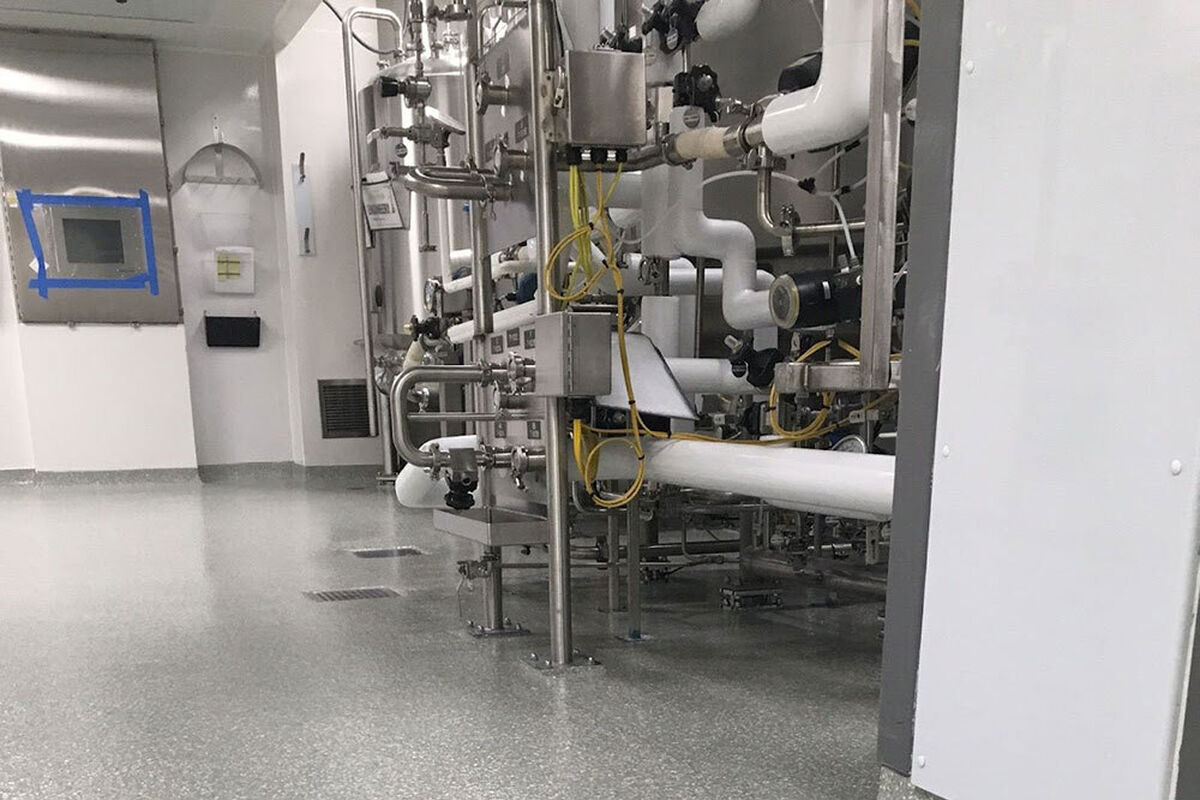How Does Industrial Flooring Solve Compliance Issues in Pharmaceutical Facilities?

Pharmaceutical facilities are governed by a stringent set of regulations. Flooring is one aspect of a pharmaceutical laboratory that should meet relevant standards set by governing bodies, and this article will discuss how the right industrial flooring can help businesses stay compliant.
How Industrial Flooring Can Solve Compliance Issues in Pharmaceutical Facilities
Compliance Challenges in Pharmaceutical Facilities
Pharmaceuticals are a highly regulated industry for many reasons. As a manufacturer of medical supplies, what you do has a massive impact on patients’ safety and lives. These medicinal supplies may even put the public’s health at risk if not closely monitored and tested to ensure quality, safety, and efficacy. It’s no wonder why such stringent rules and regulations are implemented.
Most aspects of pharmaceutical operations are heavily regulated. Regulatory scrutiny occurs in preclinical work and testing, clinical trials and operations, and manufacturing. Some rules govern sales and marketing, patient privacy, and drug price reporting. With so many requirements, ensuring compliance can become a challenge.
Another challenge is keeping up with ever-changing rules and regulations. However, non-compliance is not an option, as the ramifications of not complying can be serious; it can damage the company’s reputation and finances, even harming customers. A pharmaceutical company could face legal and criminal consequences as well.
The Role of Flooring in Pharmaceutical Compliance
When it comes to compliance, the first things that will probably come to mind are the procedures and technology used by the company. However, those are not the only business aspects subject to stringent rules and regulations. Flooring systems must also adhere to Good Manufacturing Practice (GMP) principles and comply with guidelines set by other relevant regulatory bodies.
Keeping a clean and safe working environment is a crucial regulation that pharmaceutical companies should follow. This involves installing a suitable pharmaceutical flooring system and keeping it in its best shape. The wrong type or poorly maintained flooring can increase the risk of trips, slips, and fall accidents.
Additionally, flooring may contribute to product contamination. Harmful bacteria and mold may accumulate in the floor’s gaps and crevices.
Specific flooring system guidelines in pharmaceutical companies may vary depending on your location. Generally, the floor must be easy to clean and resistant to chemical spills, microbial contamination, and heavy equipment. Also, the floor must be slip-resistant, non-porous, and seamless. These features reduce the risks of accidents and guarantee worker safety.
Key Characteristics of Industrial Flooring for Pharmaceuticals
Let’s discuss the key characteristics of flooring in the pharmaceutical industry in more detail.
Chemical resistance – Chemical spillage and cleaning agents are common in pharmaceutical facilities. To prevent floor damage and bacterial accumulation, you must select flooring that can withstand exposure to chemical agents.
Temperature resistance – This feature is particularly crucial in areas exposed to extreme temperatures. It includes testing laboratories, storage rooms, and clean rooms.
Slip resistance – This feature is necessary in preventing slip and fall accidents in the workplace. A slip-resistant floor creates positive traction, reducing the possibility of accidents and injuries.
Non-porous and seamless surfaces – In the pharmaceutical industry, non-porous flooring is necessary to prevent the build-up of dirt and bacteria. The surface should also be seamless to make maintenance easier.
Durable – Some areas of a pharmaceutical facility are exposed to heavy foot traffic. Wheeled forklifts, pallet trucks, and other equipment also likely go in and out of the facility. Hence, the floor should be durable enough to withstand the rigor of daily operations.
Aesthetics – While functionality is crucial, it is also essential to consider the flooring’s aesthetics. Most industrial flooring systems offer many customization options so facility owners and managers can create cohesive and visually appealing environments.
Even pharmaceutical storage facilities should consider the aforementioned characteristics when choosing warehouse flooring. Floors with those features enable storage and distribution centers to maintain strict hygiene and safety protocols.
Preventing Contamination With Proper Flooring
In a pharmaceutical facility, contamination can quickly turn into a nightmare with harmed consumers, recalls, profit loss, and a damaged reputation. That’s why it’s crucial to prevent contamination from becoming an issue during your production.
There are various strategies for preventing contamination, and installing proper flooring is one of them. People and vehicles may carry harmful microorganisms and foreign matter when they enter the facility. These harmful bacteria can accumulate in the hard-to-reach cracks, seams, and creases of the floor and even spread in the air, ending up in places they shouldn’t be.
Quality flooring with antibacterial or antimicrobial agents can help in preventing contamination. These types of industrial flooring can keep your floor free of mold and other microorganisms. Flooring rated as antibacterial should be non-porous and seamless. This means any spill won’t seep through the floor, leaving bacteria with no place to hide.
On the other hand, antimicrobial floors can deter the growth of mildew, fungi, and bacteria. They can also prevent odors and stains from sticking to the floor so it stays clean and visually appealing.
Choosing the Right Industrial Flooring
When it’s time for a new floor installation or replacement in your pharmaceutical facility, you’ll need to choose between concrete, urethane, and epoxy flooring. Polished concrete flooring systems are known for their excellent durability and elegant appearance. Epoxy flooring in the pharmaceutical industry is also durable, offering great versatility.
Consider the factors below when making your choice.
Installation Conditions
How fast do you need a new floor? How much downtime can your facility afford? The installation duration varies depending on the type of industrial flooring. Hence, consider the time it will take to install the flooring, especially if you need it done urgently.
Environment
Consider the environment when choosing a floor type. For example, if you are installing flooring in a temperature-controlled environment, like storage, the best choice will be flooring with thermal resistance properties.
Other Flooring Needs
Since every pharmaceutical facility is unique, always assess your facility’s needs. Your facility may require other features not on the list of recommendations above.
Style
Aesthetics also matter, especially for areas visible to visitors and stakeholders. So, you can choose the appropriate colors, patterns, and finishes that adequately represent your brand and the messages you want to convey.
Budget
Although it is always recommended to choose a flooring system that matches your facility’s requirements, your budget will still play a role in your decision. When calculating the cost of industrial flooring, ensure you calculate the price of the material and installation service.
Maintenance
Keeping floors in a pharmaceutical facility clean and sterile is vital for the safety of the products and people. The maintenance requirements of flooring materials vary, so it’s wise to determine how much effort or money you’re willing to spend keeping the floors safe and well-maintained.
Keep Compliant With Kaloutas’ Flooring Solutions
Flooring may seem like an insignificant part of a property, but it’s more than just a surface to step on. It can affect the safety of people who enter your space, the quality of manufactured medical supplies, and many other things. Installing the wrong type of flooring can put your pharmaceutical company in a lot of trouble.
When it’s time for new industrial flooring, the Kaloutas team can help choose and install the perfect flooring for your pharmaceutical needs. Our floor installers are also trained and updated with industry compliance requirements, so we’ll make sure the floor meets the standards of applicable rules and regulations. We offer a wide range of industrial flooring solutions and guarantee quality work.
If you want to know more about what the floors are in the pharmaceutical industry, please feel free to talk to our experts.




